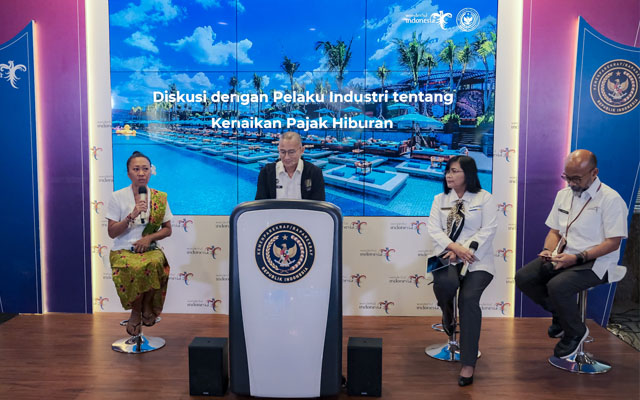Indonesia’s Ministry of Finance (MOF) has ordered higher taxes on nightclubs, discos, karaoke lounges and spas since January 5, while allowing regional government to determine how much they want to charge within that bracket.
About 36 regencies have decided to apply between 40 and 50 per cent, while other regencies like East Belitung and Siak Regency have chosen to implement 75 per cent, according to data from the Directorate General of Fiscal Balance.

Prior to this, entertainment tax was 25 to 35 per cent.
Justifying the tax hike, Lydia Kurniawati Christyana, MOF’s director of regional taxes and regional retributions, said at a media briefing last week that such services were enjoyed by the middle and upmarket communities.
MOF’s decision has met with strong protests from travel and tourism industry players, the spa association, and other tourism-related businesses. Representatives have submitted an appeal for a judicial review of the regulation.
Spa operators argued that they are part of the wellness industry, not entertainment.
Inul Daratista, an Indonesian karaoke lounge owner, said the tax increase could ultimately “kill the business”.
Ni Luh Djelantik, a businesswoman and activist from Bali, objected the hike, saying that it was unfair to “generalise that the entertainment business is only for certain people”.
She pointed out that there were also roadside spas that charge 150,000 rupiah (US$9.55) for a service. The tax hike would “kill” these operators.
Ni Luh warned that the new entertainment tax would drive tourists to other leisure destinations, like Thailand which has cut down on taxes.
She added that 60 per cent of Bali’s economy come from tourism, and the tax hike would stumble business owners that are still trying to get back on their feet after the pandemic.
MOF’s Lydia rejected the idea that the new taxes would negatively impact tourism, as not all entertainment establishments were affected. She pointed out that taxes on fashion shows, beauty contests, cinemas and concerts have gone down from a maximum tax rate of 35 per cent to 10 per cent now.
She also explained that the new regulation allows regional authorities to determine tariffs, and provide fiscal incentives in the form of relief, elimination and exceptions where necessary.
Indonesian Tourism Industry Association board member Hasiyanna Ashadi stated that there is regional autonomy, and destinations that do not wish for such entertainment facilities would implement the highest tariff rates while those that “need the money” from tourists would decide on a lower tax rate.
Nevertheless, the tax hike is expected to burden businesses that are losing their competitive edge to other destinations.
“At the end of the day, their clients will be the one to pay and they have the choice to go somewhere else more affordable,” Hasiyanna remarked.




















